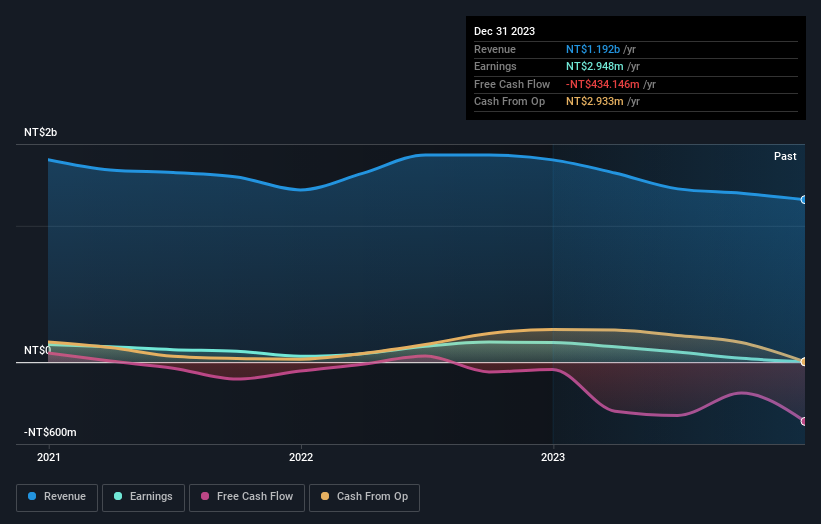Stock Analysis
- Taiwan
- /
- Medical Equipment
- /
- TWSE:4155
Despite the downward trend in earnings at OK Biotech (TWSE:4155) the stock swells 15%, bringing three-year gains to 36%

You can receive the average market return by buying a low-cost index fund. But if you pick the right individual stocks, you could make more than that. For example, the OK Biotech Co., Ltd. (TWSE:4155) share price is up 16% in the last three years, slightly above the market return. The bad news is that the share price seems to lack positive momentum recently, since it has dropped 11% in the last year.
Since the stock has added NT$532m to its market cap in the past week alone, let's see if underlying performance has been driving long-term returns.
Check out our latest analysis for OK Biotech
While OK Biotech made a small profit, in the last year, we think that the market is probably more focussed on the top line growth at the moment. As a general rule, we think this kind of company is more comparable to loss-making stocks, since the actual profit is so low. For shareholders to have confidence a company will grow profits significantly, it must grow revenue.
OK Biotech actually saw its revenue drop by 3.9% per year over three years. The revenue growth might be lacking but the share price has gained 5% each year in that time. If the company is cutting costs profitability could be on the horizon, but the revenue decline is a prima facie concern.
You can see how earnings and revenue have changed over time in the image below (click on the chart to see the exact values).

Take a more thorough look at OK Biotech's financial health with this free report on its balance sheet.
What About Dividends?
As well as measuring the share price return, investors should also consider the total shareholder return (TSR). Whereas the share price return only reflects the change in the share price, the TSR includes the value of dividends (assuming they were reinvested) and the benefit of any discounted capital raising or spin-off. It's fair to say that the TSR gives a more complete picture for stocks that pay a dividend. We note that for OK Biotech the TSR over the last 3 years was 36%, which is better than the share price return mentioned above. This is largely a result of its dividend payments!
A Different Perspective
OK Biotech shareholders are down 5.0% for the year (even including dividends), but the market itself is up 32%. However, keep in mind that even the best stocks will sometimes underperform the market over a twelve month period. On the bright side, long term shareholders have made money, with a gain of 7% per year over half a decade. It could be that the recent sell-off is an opportunity, so it may be worth checking the fundamental data for signs of a long term growth trend. I find it very interesting to look at share price over the long term as a proxy for business performance. But to truly gain insight, we need to consider other information, too. Like risks, for instance. Every company has them, and we've spotted 4 warning signs for OK Biotech (of which 2 don't sit too well with us!) you should know about.
If you would prefer to check out another company -- one with potentially superior financials -- then do not miss this free list of companies that have proven they can grow earnings.
Please note, the market returns quoted in this article reflect the market weighted average returns of stocks that currently trade on Taiwanese exchanges.
Valuation is complex, but we're helping make it simple.
Find out whether OK Biotech is potentially over or undervalued by checking out our comprehensive analysis, which includes fair value estimates, risks and warnings, dividends, insider transactions and financial health.
View the Free AnalysisHave feedback on this article? Concerned about the content? Get in touch with us directly. Alternatively, email editorial-team (at) simplywallst.com.
This article by Simply Wall St is general in nature. We provide commentary based on historical data and analyst forecasts only using an unbiased methodology and our articles are not intended to be financial advice. It does not constitute a recommendation to buy or sell any stock, and does not take account of your objectives, or your financial situation. We aim to bring you long-term focused analysis driven by fundamental data. Note that our analysis may not factor in the latest price-sensitive company announcements or qualitative material. Simply Wall St has no position in any stocks mentioned.
About TWSE:4155
OK Biotech
Manufactures, markets, and sells blood glucose monitoring devices and related homecare medical products worldwide.
Adequate balance sheet and slightly overvalued.


